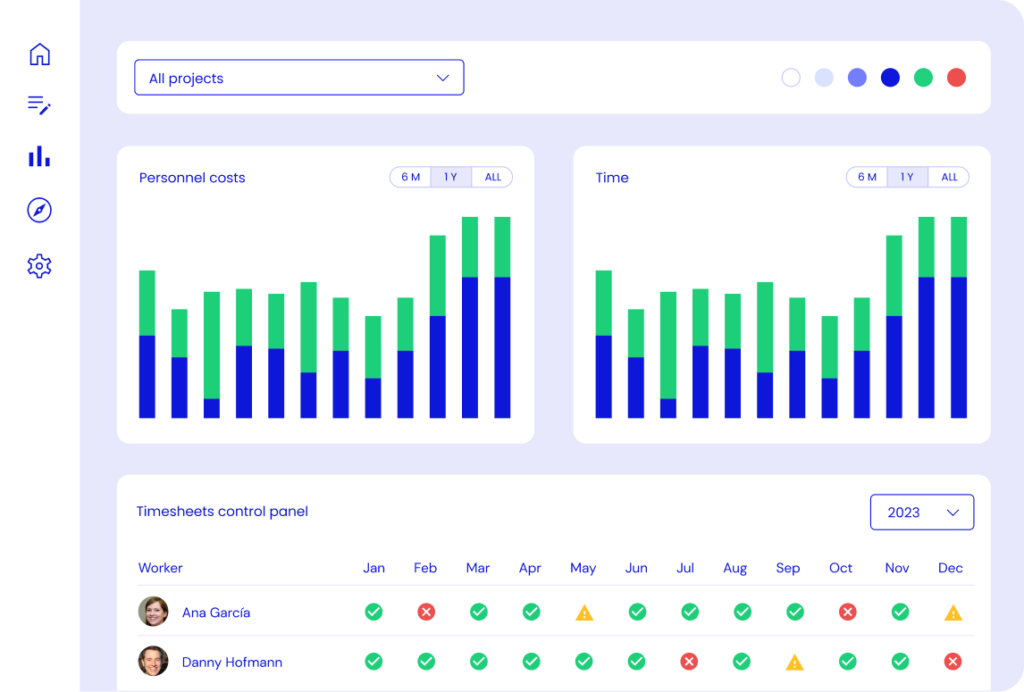Resource Allocation in Project Implementation
Time tracking is an essential record that companies or organizations need to maintain to prove the involvement of their staff in a specific project.
Often seen as a challenging task for beneficiaries and their employees, the European Commission continually seeks to streamline timesheet completion. Notably, there have been updates in Horizon Europe regarding this process.
Personnel Assignment Criteria
It’s important to remember that for personnel costs to be eligible under Horizon Europe, individuals must be assigned to the project. The Horizon Europe Annotated Model Grant Agreement specifies:
“ONLY costs for personnel actively engaged in the project (i.e., contributing to the project as per internal written directives, organizational structure, or documented management decisions) are eligible. Monthly documentation of project days worked, duly signed (refer to Article 20), or accurate timekeeping records will normally suffice as proof of project involvement — barring conflicting evidence (for instance, if an employment contract shows the individual was employed for a different project).”
Time Recording Methods
For individuals engaged in the project (regardless of their employment status or whether their work is exclusively for the project, a change introduced in 2021-2027), the beneficiary may choose to:
- Employ trustworthy timekeeping records (i.e., timesheets), either in paper format or through a digital time recording system, to log all hours spent on the project. These records should be signed and dated at least monthly by the employee and their supervisor. In cases of digital time recording, electronic signatures (linking electronic identity data like a password and username to electronic validation data) can be used, provided there is a documented and secure process for managing user access and a comprehensive log of all electronic activities.
- Alternatively, sign a monthly declaration on days dedicated to the project (using a provided template).
It remains unclear whether organizations with an existing hourly-based timekeeping system (a requirement in H2020) can switch to the simpler monthly declaration method. Further clarification from the European Commission is awaited on this matter.
Ideally, timesheets should be a daily component of your administrative process. The person working on the project should complete them, with approval from their supervisor.
Essential Information for New Timesheets
Your timesheets should minimally include:
- The project’s call identifier, acronym, and number as listed in the Grant Agreement (GA)
- The beneficiary’s full name, as detailed in the GA
- The year
- The complete name of the individual working on the project
- The monthly tally of days worked on the project within the year covered by the record
- The individual’s full name and monthly signature
- The supervisor’s full name and monthly signature
- References to the work packages in Annex 1 to which the individual has contributed through the reported workdays.
Adapting Hourly Time Records
If you opt to continue using your existing hourly timekeeping system, you’ll need to convert hours worked into productive days. Three methods for this conversion are discussed in the AGA (Page 119, November 2021 version).
Important: Consistency in Record Keeping
The information in the timesheets must align with records of annual leave, sick leave, other types of leave, and work-related travel.
Alternate Evidence for Time Spent on Projects
Examples of alternative proofs of time spent on the project include (but are not limited to): travel documents validating participation in a project meeting (boarding passes, travel tickets, hotel invoices, etc.); meeting agendas and minutes; attendance lists; working documents; laboratory logbooks; professional or personal diaries; documents related to presentations; scientific publications; and correspondence such as letters, notes, memos, emails.
Audit Criteria
In future audits, three criteria will be used to evaluate the credibility of alternative evidence:
- Unambiguous identification of the individual involved
- A direct connection to the project in question
- The ability to quantify the time devoted to project-related tasks
Alternative evidence will be accepted only if these three criteria are satisfied.
How can kronis help you?
Streamlined Time Tracking and Record Keeping:
Kronis.app provides an intuitive, digital solution for time tracking, aligning perfectly with the European Commission’s requirements for project-based time recording. Its user-friendly interface simplifies the process of logging hours, ensuring accurate and up-to-date records that are essential for compliance and audit readiness.
Customizable Timesheet Templates:
The application offers customizable timesheet templates that can be tailored to include all necessary information mandated by Horizon Europe, such as project identifiers, participant names, and work package contributions. This feature ensures that all relevant data is captured efficiently and consistently.
Secure and Reliable Data Storage:
With robust data security protocols, Kronis.app ensures that all time records and related project documentation are stored securely.

